|
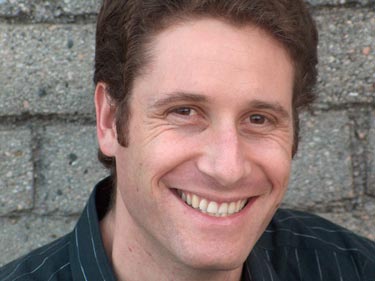
BSOSpirit: When did you begin to be interested in film music and to consider seriously becoming a film music composer?
Assaf Rinde: I always felt like I was born into music. The music was always there, surrounding me.
I was always attracted to strong images and was spending lots of hours watching movies, so it just seemed very natural to me to just follow what I feel and enjoy both worlds.
I think it was around the age of 15 when I really noticed how the music plays to picture on movies such as ET, Back To the Future, James Bond for example, and since I was already composing music since I was 11, it seemed so easy to just start experimenting with the film world which I was always captivated with; there was something about movies that really got my attention and I could never explain it, but certainly felt drawn to it. So, I think I was 16 when the idea was fully revealed in my head and heart for life.
BSOSpirit: How did you get your first assignment as a film music composer?
Assaf Rinde: My first film….. So much has changed since then. :-)
For a very long time I have been friends with film editor/director Meir Katri before we even talked about movies. He is a great drummer but also a very talented film maker and we had been talking a lot about music for many years. At some point (2000) he was producing a teen drama called “Shalom Latmimut” (Goodbye Innocence) for a local TV station in Israel, and he knew of my music and my passion to compose music for movies. So he actually offered me the gig based on that, and I believe he was happy with the results when we were done. I had been experimenting a lot with video editing and music for picture, but I’d say that was my official first assignment in this field.
BSOSpirit: Could you describe to us how is the working process for low-budget films? Does the lack of resources translate into an increase of the creative freedom?
Assaf Rinde: Big budget movies are usually on a much tighter schedule. In some cases the composer does not have more than a month to compose 70 minutes (average) music and within this time period the music should be recorded, produced, orchestrated, edited and mixed…. It is rarely the case in the low-budget world, but occasionally it happens too. When I was working on the score for the horror movie NAILD, I had 28 days to start and finish 60 minutes of music. Because it was a low-budget movie they couldn’t afford paying a team to help me out, so I ended up doing everything myself. I must say that deadline makes it a lot easier to me, since the adrenalin kicks in and helps my muses to play better.
Another thing that is a bit different about composing for independent and low-budget movies is the moment of final decisions. On a low-budget movie you will be VERY carful and you will make sure the music is really approved and final before you go and spend time/money on live musicians. The midi version will reflect perfectly everything so no one will have to guess anything. On big-budget cases, there is usually more time/budget to spend on the live element, so you can make a few of the final tweaks on the stand and get the results in real time when you record the live orchestra. Also this is kind of the last station for the director to approve everything.
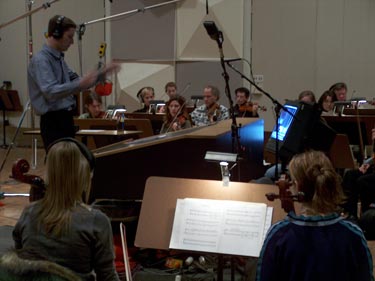 Overall, I think that creative people will always be creative, no matter what the budget is. The creative freedom is usually there in almost every project. I think the freedom of musical direction is sometimes affected by the scale of the production. Usually, on the low-budget side of the map, there is more experimenting going on. Some of it, is because of artistic decisions but some of it is definitely being affected by the budget. Overall, I think that creative people will always be creative, no matter what the budget is. The creative freedom is usually there in almost every project. I think the freedom of musical direction is sometimes affected by the scale of the production. Usually, on the low-budget side of the map, there is more experimenting going on. Some of it, is because of artistic decisions but some of it is definitely being affected by the budget.
In many cases, you just don’t have the budget to go and record an 80-piece orchestra. Sometimes you simply don’t need this effect, but what are you going to do when you really need it, and you can’t afford it? That is when you’ll start looking for other solutions that will give an equally powerful emotional impact. This is when the real creativity comes into play.
Think about what happened with car companies lately when gas prices became a problem. Suddenly all the car companies were able to create more fuel-efficient cars. None of these new technologies would be here if gas was much cheaper and this is not because it was impossible before. It is because there is no other way around.
Same with low-budget movies. You just don’t have all the tools to do it the straight way, so you look for new solutions and directions to achieve what you need.
BSOSpirit: You have also taken part on big budget movies, working with Christopher Young in, for instance, “Spiderman 3”, “Drag Me To Hell” or “Untraceable”. As musician, what differences have you spotted between these two worlds, the big budget film and the limited budget film?
Assaf Rinde: There are a few differences that I can think of, but let me start with saying that filmmaking is simply filmmaking no matter what the budget is. I think what really affects the experience is the actual story, no matter how big the budget is. If the story isn’t there, all the big visual effects will never really be able to take its place. Having said that, when you are working on such big budget films like Spiderman 3, and Ghost Rider you can really elevate the music on a similar scale with all the action. This is actually a lot of fun, not only to watch, but also to work on! It can also be very stressful, because you can’t make a mistake that will cause the production company to spend even more money (though this can also be true for low-budget productions). I consider myself very privileged to be working with Christopher Young on such amazing film projects.
Another element that is really important with higher budget movies is the ability to be part of a team. For some composers it can be really hard to do, but this is a key element in filmmaking in general, and film music making, specifically.
 BSOSpirit: Christopher Young must be really satisfied with your work for his last scores, because he keeps relying on you but, which is specifically your role in these compositions? BSOSpirit: Christopher Young must be really satisfied with your work for his last scores, because he keeps relying on you but, which is specifically your role in these compositions?
Assaf Rinde: Christopher Young is such a great composer with so much experience and I really love his music. There is so much to learn from his extensive musical background. When he works on a movie, there are lots of very important steps that have to be made, and can’t be made by the composer himself because of the lack of time.
As I mentioned before, sometimes you don’t have more than six weeks to complete a full 60-80 minute score. When you deal with a big action movie it can get even harder since there are many more notes on the score page, as well as many details that have to be there no matter what. In addition, to really get everything done on time and on the highest level you have to involve more people in the process of creating the final score; this assures the quality in the best possible way and to proof read/hear that there are no mistakes.
My role on any given project with Christopher usually depends on what the project really needs at a certain point. For example, on Spiderman 3, I programmed the synthetic (computer-based) elements that end up in the final score as well as helping out with the mockups that were presented to the director. On Ghost Rider, I was involved as a music mixer for the final score as well as the soundtrack CD. Recently I produced for Christopher the soundtrack album for the new horror movie THE UNINVITED, which needed completely different skills.
I must say I really enjoy working with Christopher on such amazing projects.
BSOSpirit: You have also worked along with Michael Giacchino, specifically in the TV series “Lost”. Which was your job in this popular show?
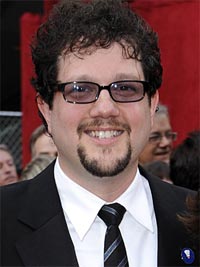 Assaf Rinde: That was one of those moments where you meet someone really successful and generous at the same time. I was just finishing up my studies at the SMPTV program in USC when Michael (together with the faculty) had selected a number of students to give them the experience of “the real world”. I got the opportunity to orchestrate and prepare a few cues for the second season of LOST and was invited to also conduct the orchestra when these cues were recorded. We recorded it at Capitol Records and Michael was the nicest guy ever! Assaf Rinde: That was one of those moments where you meet someone really successful and generous at the same time. I was just finishing up my studies at the SMPTV program in USC when Michael (together with the faculty) had selected a number of students to give them the experience of “the real world”. I got the opportunity to orchestrate and prepare a few cues for the second season of LOST and was invited to also conduct the orchestra when these cues were recorded. We recorded it at Capitol Records and Michael was the nicest guy ever!
It is always great to work with a real master.
BSOSpirit: We have listened to your composition for “Kill Zone” and we literally loved it. How did you join this project?
Assaf Rinde: Kill Zone was one of those rare cases when I just answered an ad and got to talk with someone. Mikey Carr (Editor/Producer) had posted an ad online saying they needed a composer to score a western movie with a special need for a modern Morricone score.
After a few weeks, I heard back and had a great meeting. Vitor Santos (Director) wasn’t in town, but I had the opportunity to talk with him over the phone on several occasions and we really clicked right away. The rest is pretty much history…..
BSOSpirit: In “Kill Zone” you have worked with a very young director (he was eighteen years old when he shot the film), Vitor Santos. Which role has played his youth in communicating you his requirements for the score? As a director, does he understand the musician and his creative process?
Assaf Rinde: Yes, Vitor is very young. He started this movie when he was 18 years old (which is hard to believe), and another 4 years passed before he and I actually started to work on this movie. It was one of the best experiences to date, not only because I liked the project, but Vitor was so much fun to work with. He challenged me with his unbelievable knowledge of music history and film music. He really understands the power of music in movies. Since he is very knowlegeable about music, not only was he able to reference a specific score from the past, but also reference a specific scene and its score, and gave me the right information in terms of the emotional analysis of how this cue works with this scene. The main challenge with Kill Zone was the simple fact that there was not much dialog in this movie. It is actually the dream of every film composer to write music for beautiful and strong images, but at the same time, it can be a real challenge to keep developing the music in an interesting way so it’ll not be so predictable to watch and listen to.
Vitor brought a lot into the process and he knew a lot being a young director in this business. I think his natural cinematic sensabilities are really unique and advanced beyond his years. I had a real pleasure working with him.
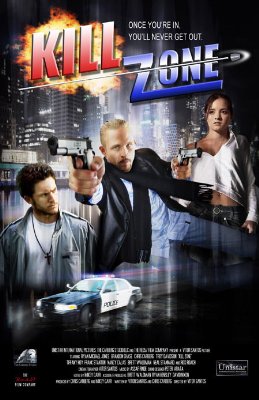 BSOSpirit: Who decided to give the score that Morricone sound? BSOSpirit: Who decided to give the score that Morricone sound?
Assaf Rinde: Kill Zone is kind of a tribute to Sergio Leonie’s old westerns. When they first edited the movie, they temped the movie only with Ennio Morricone’s scores to these old westerns. Kill Zone is not the traditional western. It is more of a modern western since there are cars instead of horses, the guns are different, there are phones and cell phones… So the movie needed the flavor of these old westerns but in a very modern way, and that is what I tried to do. At the end of the day, I felt like I had to get a signature sound of my own in this score, but how could I not rely on the past? I think at the very beginning and at the very end of the score, the Morricone past (in a modern way) is really there, but the rest of the score is definitely something else.
BSOSpirit: We have also detected an Asian soundtrack flair, especially when Iris Malkin’s voice appears. Was that a deliberate choice?
Assaf Rinde: The vocal part in the score is there to play on the real pain in the characters’ hearts. There is maybe something Asian about the vocal treatment but not the melody or the harmony. One thing for sure, my music is always a blend of so many different styles not related to each other, which are usually creating some new concept. I need the music to work emotionally, and that is what led me to this decision. I must say Iris did an amazing job here. Her vocal qualities and her unique vocal color made her the perfect choice for that score. She is the real deal, and will always be my first call on any project. Iris is also my fiancée, but that had nothing to do with me choosing her for a certain gig. Iris has worked with the top musicians in this world including Andrea Morricone, Teresa Berganza, Pierre Boulez and many others from the very top of the list.
Sometimes I use her as a pianist since she is also a very skilled pianist.
And of course…. I love her so much :-)
And a bit more on the same subject. When I worked on Kill Zone, I had the privilege of working with two other great colleagues of mine. One is Sean Hennessy. This is the guy who played those really hard trumpet lines on the score. He is a very gifted musician. He brought to the trumpet parts so much heart and soul, especially on the track THE LAST DANCE. The other one is Israel Klich who played all the guitar parts on the score. Israel actually comes from physics more so than music, but he is also a great flamenco and classical guitarist. He played the guitar parts on a flamenco guitar (which is a bit smaller than the normal classical size) and he helped establish some very unique sounds for the score.
BSOSpirit: Which are your favorite composers and who would you like to be compared with in the future?
Assaf Rinde: This is always a hard question for me to answer since I don’t believe there is one composer that has it all. I usually like a few specific pieces from a composer. I love works by Rachmaninoff, Vivaldi, Ravel, Khachaturian, Sting, Zimmer, Williams (John and Vaughan), Richard Addinsell and Ennio Morricone of course….. There are so many of them, but I never compare myself with any one of them. I think that every composer has his own DNA in his music. It is like Bach in the way it is taught in music academies today. Students are getting all the perfect formulas to create the very mathematically perfect Bach, but it is never going to get even close to Bach; that can only be achieved by imputing his/her personal musical DNA into the equation. To me, it is more about the personality of someone conveyed through music.
If it is a good person, I don’t mind being compared with them :-)
BSOSpirit: Which kind of movie would you like to have the chance to score, not having worked for that particular genre before?
Assaf Rinde: I have worked on almost every film genre on some level but what I really like is the Action and Drama combination. It has some power to it and I like to write music that has a real emotional impact, but at the same time has temperament. I believe that any movie can be good if the story has a good structure to it. There is nothing that can replace a good story. Bad music can rarely destroy a really good story, but great music can’t really make a bad story great.
BSOSpirit: Being the musical technology so present in your compositions, have you considered composing music for the videogame world, so fashionable nowadays among film music composers?
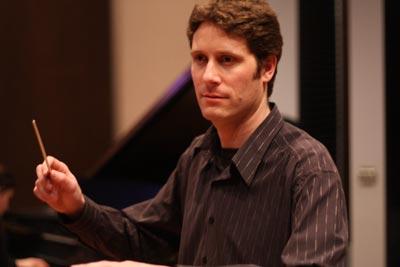 Assaf Rinde: I am definitely a gearhead! I can spend hours talking and exploring technologies. Assaf Rinde: I am definitely a gearhead! I can spend hours talking and exploring technologies.
I have been playing video games from the early days on the Comodore 64 to the current console enironment. I can really get excited from all of this. I not only considered getting into video games but have been already involved on some of the bigger ones out there. I am collaborating a lot with composer Inon Zur, who is not only an amazing composer but also a very good friend. I assisted him with some work on the latest Prince Of Persia as well as a new RPG. I have composed cues for other video games and actually have a game project starting very soon. I think that video games are an amazing platform for composers to get really creative in terms of new music and advanced technologies. It is a bit different from movies in the process of structuring and composing, but in video games like in movies, writing for a storyline always intrigues me.
In general, I think that the variety of different things you can do today in the music business is pretty amazing and keeps everybody really fresh. There are lots of elements coming from the traditional orchestra into rock, from dance music into soundtracks and at the end of the day, dramatic music is dramatic music. I also spent time writing music for movie trailers such as Race To Witch Mountain and Starship Troopers 3.
We live in one of the best eras where composers can expand upon their livelihood of making music and there are so many ways to do it in today’s broad spectrum of entertainment. I welcome that for the love of music. Any music!
BSOSpirit: Which are your upcoming projects, if you are able to tell us about them?
Assaf Rinde: Well… This is always a very sensitive matter, but what I can say is that there is a movie coming in the summer as well as this video game I have mentioned earlier.
Sorry, but I can’t give any more details than that, except for the fact this is going to be a very busy rest of the year for me. I feel very blessed to be busy doing what I love doing the most!
www.assafrinde.com
Interview by David Doncel Barthe - Translation by Asier G. Senarriaga
|





